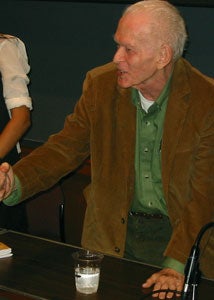Gene Sharp, an emeritus professor of political science at the University of Massachusetts Dartmouth and founder of the Albert Einstein Institution, is widely credited as one of the principal initiators of the Arab Spring. His 1993 book, “From Dictatorship to Democracy,” which promotes the principle of nonviolent struggle, is created with inspiring the revolution in Egypt, as well as in other countries all over the world.
On Oct. 11, a new documentary about Sharp’s work, “How to Start a Revolution,” by producer director Ruaridh Arrow, was screened at Harvard Law School.
The event, sponsored by the Program on Negotiation and the Harvard Law Documentary Studio, featured a panel discussion with Sharp and Arrow. Jamila Raqib, executive director of the Albert Einstein Institution, also participated, and Susan Hackley, managing director of the Program of Negotiation, moderated.
Arrow, who reported for the BBC from Tahrir Square during the Egyptian revolution, said, “It is a great honor and privilege to make this movie. Sharp is one of the real heroes of our time and it is important to document this for the future generations.”
Following the presentation, Sharp participated in a Q&A about his work.
“The phenomenon I have been describing in my book is growing and so much has been changed already. I grew up in the post World War II period and lived the Cold War, which seemed to be unfixable at the time and now it is gone,” said Sharp. “When people are no longer intimidated and become conscious of their rights there is hope for change.”
But as several audience members pointed out during the talk, starting a revolution does not necessarily mean success: the Arab Spring is a controversial movement and it is difficult to know what happens after the revolution.
“The actual situation is not good and this is not a surprise,” said Sharp. “We have many examples in history, including the Shah revolution in Iran, but those bad outcomes are not a good reason to sponsor dictatorships,” he said. “The population needs to be heard and has a right to react to dictatorships.”
In order for a revolution to be successful, said Sharp, there must be a plan in place. “In a revolution you have to know where you are going,” said Sharp. “Most people operate with their feelings and not with their head, but a revolutionary movement cannot start only from the heart, you need to study and plan a revolution in multiple details to make it work.”
Last March, at a lecture sponsored by the Harvard Law School Advocates for Human Rights, Sharp discussed various elements of an effective nonviolent struggle and addressed the demonstrations in the Middle East.
Sharp is the senior scholar at the Albert Einstein Institution, a non-profit organization he founded in 1983 to study the use of strategic nonviolent struggles in conflicts around the world. He has a D.Phil. in political theory from Oxford University and held a research appointment at Harvard’s Center for International Affairs for nearly three decades. He is the author of “The Politics of Nonviolent Action” (1973) and most recently, “Waging Nonviolent Struggle: Twentieth Century Practice and Twenty-First Century Potential” (2005).
—Dalia Palombo
